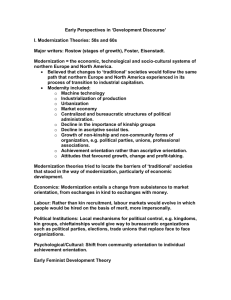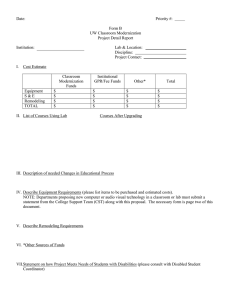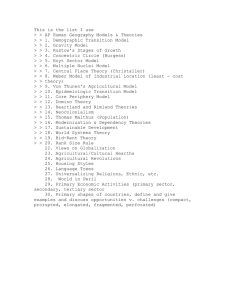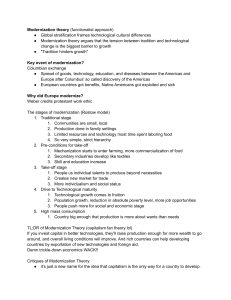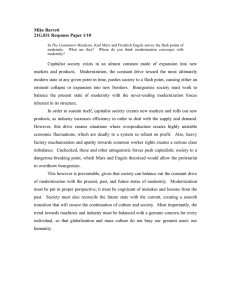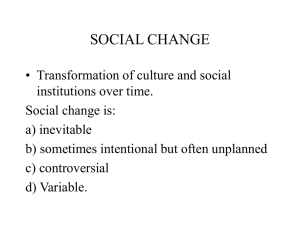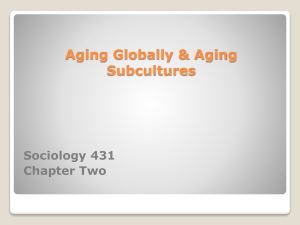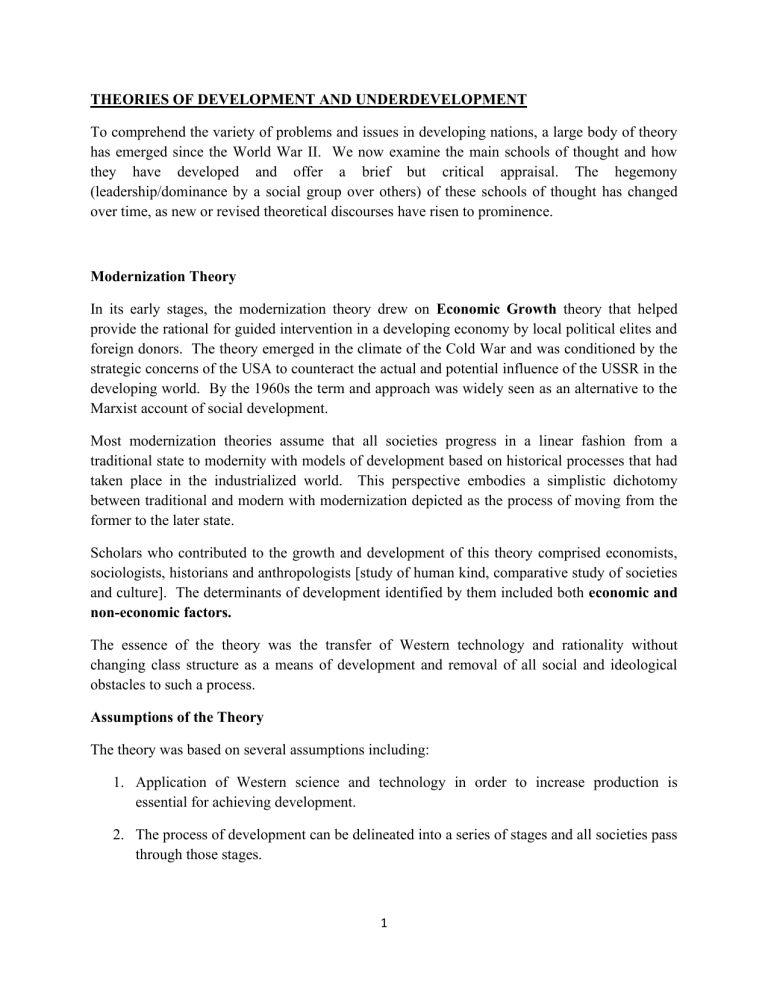
THEORIES OF DEVELOPMENT AND UNDERDEVELOPMENT To comprehend the variety of problems and issues in developing nations, a large body of theory has emerged since the World War II. We now examine the main schools of thought and how they have developed and offer a brief but critical appraisal. The hegemony (leadership/dominance by a social group over others) of these schools of thought has changed over time, as new or revised theoretical discourses have risen to prominence. Modernization Theory In its early stages, the modernization theory drew on Economic Growth theory that helped provide the rational for guided intervention in a developing economy by local political elites and foreign donors. The theory emerged in the climate of the Cold War and was conditioned by the strategic concerns of the USA to counteract the actual and potential influence of the USSR in the developing world. By the 1960s the term and approach was widely seen as an alternative to the Marxist account of social development. Most modernization theories assume that all societies progress in a linear fashion from a traditional state to modernity with models of development based on historical processes that had taken place in the industrialized world. This perspective embodies a simplistic dichotomy between traditional and modern with modernization depicted as the process of moving from the former to the later state. Scholars who contributed to the growth and development of this theory comprised economists, sociologists, historians and anthropologists [study of human kind, comparative study of societies and culture]. The determinants of development identified by them included both economic and non-economic factors. The essence of the theory was the transfer of Western technology and rationality without changing class structure as a means of development and removal of all social and ideological obstacles to such a process. Assumptions of the Theory The theory was based on several assumptions including: 1. Application of Western science and technology in order to increase production is essential for achieving development. 2. The process of development can be delineated into a series of stages and all societies pass through those stages. 1 3. In the process of development, traditional social and political institutions are replaced by modern ones. 4. Traditional feudal forms of political power will be replaced by democratic forms of governance. In a nutshell, the Modernization Theory presented the ‘American way of life’ as the epitome of modernity. General Features of Modernization Theory 1. The nation state was the unit of analysis [macro and not micro] 2. Majority of the theories saw modernization as a comprehensive process with potential to transform all aspects of the society in question. 3. The modernization theories are concerned with how traditional values, attitudes, practices and social structures breakdown and are replaced with more modern ones. 4. The theories regarded the Western Industrial countries as modern and the developing countries as traditional. 5. The majority of the theories [Rostow (1960); Hagan (1962) and Eisenstadt (1966)] saw the causes of developing country poverty and misery as primarily internal to the country lying in pre-capitalist and preindustrial institutional structures which are in effect antithetical to development needs and processes. DEPENDANCY THEORY As the shortcomings of the modernization theory became apparent, the dependency theory dominated development thinking in the 1960s and 1970s This school sees global wealth and poverty as directly linked to the historical operation of the capitalist world economy. Dependency theory maintains that global poverty historically stems from the exploitation of poor societies, by rich societies placing primary responsibility for global poverty on rich nations. According to this theory, the world could be divided into core and peripheral regions. That the peripheral countries are seen as part of the global system dominated by the capitalist economic network with the rich core countries dominating and exploiting them. 2 The core countries are seen as transferring most of the resources from the poor countries to themselves. This transfer can occur in many ways including colonial and neo-colonial relationships or the operations of multi-national corporations. The intellectual foundation of this new school of thought was deeply rooted in the ideas of Karl Marx, Friedrich Engels and other Maxist thinkers. These scholars believed that the process of social change was not gradual and evolutionary as assumed by the Modernization Theory. Instead it was characterized by conflict of interests between classes in society or in other words class struggle. The Marxist saw class struggle as the engine of social change and development. The Marxist argued that imperialism was an exploitative system of economic, social and political relations. The system changed the colonized nations into sources of cheap inputs to production in the capitalist nations as well as markets for their products. Such a situation in the capitalist system meant a complete reversal of the logic of modernization from the promise of development to impoverishment. Features of the Dependency Theory 1. Under development is viewed as something created within a pre-capitalist society that begins to experience certain forms of economic and political relations with one or more capitalist societies. 2. Under-development is not a product of internal deficiency as proposed by the modernization theory. It is rather a process or a state that results not so much as the absence of something as the presence of something. Assumption 1. The main assumption is that development and underdevelopment are inversely related. That is the theory sees underdevelopment of a region or society as a process that is linked to the development of another region or an outside society. 2. The more dependent countries are also less prosperous” (Craig, 1996 thesis) 3. In order for the underdeveloped countries to develop they must disassociate themselves from all relations with the First World. 3 Main Arguments of the Dependency Theory 1. The developed countries could not have achieved the level of development that they have, without the systematic exploitation of the developing countries. 2. The process of development passes through a series of stages in an illusion. Developing countries cannot attain development following the path adopted by developed countries so long as the exploitative world system exists. 3. Countries that are now poor were not so to begin with. Rather they have been forced into the stage of underdevelopment by a global system of capitalist exploitation. 4. Developing countries can develop only by cutting their links with the developed world. 4
